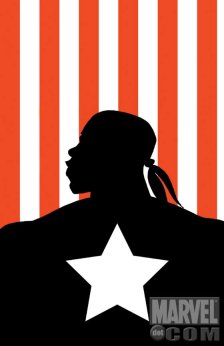| Words
and Pictures
Marvel's
Truth: Red, White and Black generated a lot of controversy
when it was first announced. Some people weren't comfortable
with the idea of Captain America being tainted by racism.
I wasn't one of them.
America
has a racist past and only by acknowledging it can we ever
truly put it past us. Captain America, the living symbol of
all that is right about our country, sometimes needs to be
confronted by the things that are wrong. Truth promised
to do just that, but it fell short.
In terms
of sales, the book is doing alright. The first issue was ranked
number 15 on Diamond's sales chart with subsequent issues
coming in slightly further down on the charts. Though if the
store I work at is any indication, the sell-through has dropped
off significantly after the first issue.
Many of
the people who bought the first issue simply aren't coming
back for the second. The primary reason is one of distribution.
Truth is one of those rare comic book projects to garner
mainstream media attention. It was written up in USA Today,
talked about extensively on NPR and even made the subject
of a New York Times editorial. There were literally millions
of "civilians" who knew about this book. So where
were they? Not in comic stores, obviously.
Which
shouldn't come as a surprise. Most people don't know where
the comic book stores in their area are and aren't willing
to make the effort to find out. And even if they did make
the trek to the comic store for the first issue, what are
the odds that they'll come back every month for the next six
months to buy all the subsequent issues? Slim to none.
The serial
format pamphlet format is a dinosaur in many ways, but especially
so in the case of high-profile projects with mainstream crossover
appeal. Truth should have been released as an original
graphic novel simultaneously in bookstores and comic shops.
That would solve the problem of declining single issue sales
for the comic shops and get the book to a much wider mainstream
audience while it still had some heat on it.
Of course,
poor distribution isn't the only reason Truth is failing
to light the world on fire. Part of the blame must be placed
squarely on the shoulders of writer Robert Morales (editor
of Vibe magazine) and artist Kyle Baker (Why I Hate Saturn).
Morales demonstrates an excellent ear for dialogue and a deft
hand when it comes to characterization, but his plotting and
sense of pacing leave a lot to be desired. The book moves
at a glacial pace and Morale's story of four black servicemen
from different backgrounds who struggle with the idea of serving
a country that treats them as second class citizens is a good
one, but this isn't the story of the Tuskegee Airmen. This
is a story about Captain America, and he is nowhere to be
found.
Truth
would be far more powerful if it involved Steve Rogers from
the start. How does a man whose entire existence is defined
by service to his country deal with a revelation like this?
How does the country at large, Americans both black and white?
These are the big questions raised by Truth - too bad
Morales doesn't seem interested in answering them.
Then there's
the implausibility of it all. When Morales has the U.S. government
sending hundreds of black servicemen off to what is, for all
intents and purposes, a death camp, he loses a lot of credibility
in my eyes. The Tuskegee syphilis experiments which clearly
inspired this story were abominable and truly unforgivable,
but America in the 1940s was not Nazi Germany. Even if there
were enough rabid racists in the military and political structure
to approve measures like these (which I sincerely doubt),
it would be impossible to keep the disappearance of hundreds
of servicemen - black, white or anything in-between - a secret.
Real life isn't the X-Files and there aren't enough men in
black in the world to stop a story like that from getting
out.
And the
art… Kyle Baker was the wrong choice for this book from
the start. I'm a big fan of the man's work, but his style
only really works for comedy - and this is no comedy. It's
like getting the Farrelly brothers to direct an adaptation
of Howards End or putting pickles in ice cream. Some
things just don't go together. It doesn't help matters that
Baker is putting out the worst work of his career. The line
work is sloppy, the colors garish and the backgrounds non-existent.
Truth looks rushed and amateurish - not the kind of work one
expects to see on such a high-profile project.
There's
nothing I hate more than wasted potential. Truth could
have been one of the great Marvel stories - a superhero story
with relevance and importance that could actually get mainstream
America to sit up and take notice.
Instead,
it's just another comic book.
|






